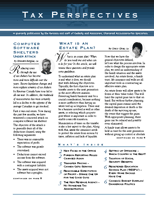
PDF Format
 Issue Contents Issue Contents
 All Issues All Issues
October 1997
What is an Estate Plan?
By Grace Chow, CA, TEP
Cadesky and Associates LLP (Toronto)
What is an estate plan? When do you need one and what can it do for you? In this article, we will review these questions and provide some guidelines. To understand what an estate plan is and what it does, we should start with defining the objectives. Typically, the first objective is to transfer assets to the next generation in the most effective manner. Preserving family harmony may be a crucial consideration, because nothing is more ineffective than having an estate tied up in litigation. There may be a business involved as well as other assets, so selecting which property goes where is important in order to enable a smooth transition. Minimization of taxes on the transfer is also a key aspect to the plan. Along with this, assess the insurance needs to protect the estate from erosion by taxes, inflation and lack of liquidity. Now that we have the general objectives defined, let's see what the process involves. In order to design the appropriate estate plan, we need an understanding of the family situation and the assets involved. An estate freeze, a family trust, life insurance and wills are all important tools in constructing an effective estate plan. An estate freeze will allow assets to be frozen at their value today. This will limit the capital gains tax to that on hand. But without further planning, the capital gains remain until the deemed disposition at death or the death of the surviving spouse, the event that triggers the gains. With appropriate planning, these gains can be reduced and possibly even eliminated. A family trust allows assets to be held in trust for the next generation without giving up control or absolute ownership. The family trust can be discretionary and the decision as to whom to pass on the asset to can come at a later date. There are many different types of life insurance products. Understanding each is important in choosing the ones that best suit your needs. Coordination with a life insurance agent is necessary in designing a comprehensive estate plan. Finally, a proper will should be drawn up. The will should be revised periodically. If you have substantial assets, planning for your estate may be the most important tax and financial planning you ever do.
|